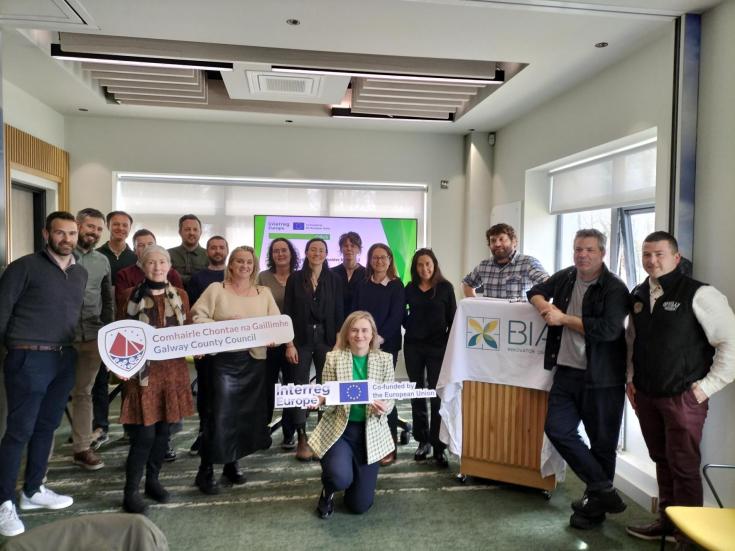CIBUS in Action in Galway: Shaping Sustainable Food Systems
Galway’s Stakeholders Shaping Sustainable Food Systems
The second Regional Stakeholder Group Meeting in Galway region was held on 26th of March 2025, at the BIA Innovator Campus in Galway. The event brought together key players from the region’s food production, supply chain, and policy making sectors to continue the goal for a collective effort in reducing food loss and waste in the Irish region.
Recap of the CIBUS Project
Michelle Kelly and Enda McEvoy of BIA Innovator Campus welcomed participants to the second Regional Stakeholder Group (RSG) meeting of the CIBUS Interreg Europe project, hosted on behalf of Galway County Council. They provided a brief recap of the project’s aim: reducing food loss and waste (FLW) across eight European regions by enhancing public capacity, encouraging policy innovation, and building cross-sector collaboration.
Galway County Council’s role as project partner includes aligning CIBUS goals with the Galway County Development Plan 2022–2028, ensuring that sustainable food system strategies are embedded into long-term local policy.
Fork to Farm: Empowering Citizens in the Food System
A key theme of the meeting was the "fork to farm" approach, emphasizing citizen agency in driving sustainable food systems. PhD student Nicole Olweean (University of Galway) shared early findings from research into citizen perspectives on sustainability. Focus groups revealed growing concerns about plastic and food waste, and a desire for more local, seasonal, and community-rooted food options.
The role of citizens as both market influencers and policy participants was discussed, with support voiced for a citizen assembly on food in Ireland to enable bottom-up change. This was presented as a practical tool to influence policy and amplify community values.
Community Voices and Local Innovation
Clare Davey of Hinterland delivered a powerful presentation on how Galway communities already possess the tools to create sustainable, inclusive food systems. She outlined projects such as rooftop gardens, mobile community grocers, and school-based food education, all rooted in reconnecting local people with land, food, and each other. Her message was clear: small starts can lead to big shifts.
Diarmuid O’Mathúna of POTA Café shared real-world experiences from the hospitality sector, reflecting on the challenges of sourcing local produce and managing food waste in a rural restaurant setting. He emphasized the importance of resilient supply chains, community connection, and policy support to help businesses reduce their environmental impact while staying viable.
Key Topics Discussed
- On-Farm Processing & School Meals: The potential of on-farm processing to reduce waste and improve producer viability was explored. School meal programmes were also discussed, with concerns about meal quality and significant food waste. Some schools are trialling redistribution, but practices vary.
- Waste Management and Education: Composting and anaerobic digestion (AD) were discussed as key technologies, with a need for greater community understanding and education. Schools were identified as key sites for piloting both waste reduction and awareness campaigns.
- Policy and Funding: Attendees called for policy revisions and better funding mechanisms to support circular food systems. Extended Producer Responsibility (EPR) schemes were identified as a possible funding source for local initiatives.
- Food Policy Council Proposal: Momentum grew around the idea of creating a Galway Food Policy Group to coordinate public, private, and community efforts in food sustainability. This group would set goals, support pilot projects, and track measurable outcomes.
Good Practices and Lessons from Europe
Attendees reviewed examples from other regions including:
- FoodCloud – a redistribution platform connecting surplus food from businesses to charities.
- The Food Waste Charter – a voluntary business commitment to waste audits and reduction.
- Green Schools Programme – integrating sustainability into school culture and curricula.

